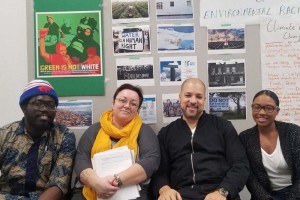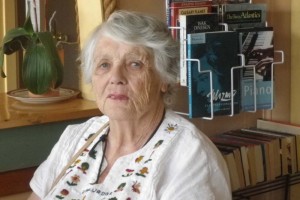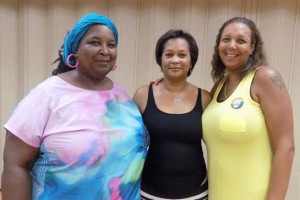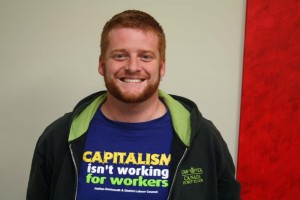I grew up poor in Milton, Ontario," says Anna Willats, a 52-year-old butch lesbian mother of two, community activist, feminist, educator, and sometimes baseball and soccer player. "At that time it was a town of about 5,000 people. It was very different growing up poor in a rural area in the 50s and 60s than it is growing up poor in Toronto today. I didn't know we were poor until I was much older." Today Willats teaches in George Brown College's Assaulted Women's and Children's Counsellor/Advocate (AWCCA) Program as a part-time, and pro-union, professor. She also sits on the board of the Mayworks Festival of Working People and the Arts, in Toronto, is a member of the Toronto Police Accountability Coalition, publishes a weekly e-newsletter called "RISE UP! News and Events," and teaches a leadership course for drop-in service users.
She received NOW magazine's "Best Activist for 2006" award, was part of a team that received the 2007 City of Toronto "Access Award for Disability Issues" for their work with drop-in users, and, in 2008, she was named "Honoured Dyke" by the Toronto Pride Committee, and held the vanguard position in Toronto's Dyke March as a result.
UNION DRIVE
Though she is not in the vanguard of the Ontario Public Service Employees' Union's drive to organize part-time and casual college workers in Ontario, she has certainly done her part to support the campaign. Willats participated in the formation of the Organization of Part-Time and Sessional Employees of the Colleges of Applied Art and Technology (OPSECAAT), including the election of their first executive. These days, her involvement in the drive is more low-key: "I wear my yes' button, and encourage others to get out and vote."
This certification vote came about as a result of four years of lobbying, campaigning and getting people to sign membership cards. Part-time and sessional college faculty in Ontario -- about 9,000 workers -- were only recently granted the right to unionize when changes were made to the Colleges Bargaining Act in October 2008, putting an end to more than three decades of pre-existing legislation that prevented them from organizing. But these changes were neither quick nor easy to attain, especially since, by definition, these workers are hard to reach and
highly transitory. The total of part-time faculty and support staff at Ontario colleges is around 17,000.
Willats, who started at George Brown as a part-time instructor in 2000, is now a part-time professor and also the field placement coordinator for the Assaulted Women's and Children's Counsellor/Advocate Program.
"I love my work," she says. "I enjoy doing it very, very much, but I dislike, intensely, being invisible, and you realize that you're invisible often. You're invisible when they talk about all of the things that staff are going to enjoy and you know it doesn't mean you. You don't have phone or e-mail listings on the website, you don't exist in certain kinds of ways. Yet, you're relied on. You're always in the process of re-negotiating contracts, you can never be sure that you're going to be teaching next year. I think for a lot of people that becomes very difficult."
It is exactly this type of inequity that the 12-day, Ontario-wide vote from January 19 to February 6 is set to address. If the majority of the affected workers vote yes, they become members of OPSEU like their full-time counterparts, and then begins the task of bargaining for a collective agreement that will guarantee these workers rights, such as fair and unified pay province-wide,
benefits, job security and a more stable work environment.
With evident enthusiasm, Willats says: "I'm excited that we're going to vote. I'm almost officially a card-carrying union member!"
MAYWORKS FESTIVAL
On the lighter side of life, Willats is heavily involved in Toronto's Mayworks Festival of Working People and the Arts, where she currently serves as co-chair on the board of directors. She can't quite hide the pride in her voice as she talks about her work there, and with good reason. "I did my first collective bargaining, in a management capacity," she says. "We have some neat progressive language in our contract, a good equity policy. We go beyond the human rights code and try to address class and transgender issues." The festival staff, members of Canadian Union of Public Employees Local 1281, renewed their collective agreement in the fall of 2008.
Since Willats comes into her role at Mayworks as a community rep, not a union rep, being involved with the festival has been an education for her. "I really enjoy watching the festival take shape every year. I like how Mayworks addresses organized workers' issues, but also unorganized workers' issues, injured workers, those groups that are on the margins. And the poetry marathon was something that my partner and I saw in New York, and we thought, 'We should try that in Toronto!' That's been fun to put together."
Willats is referring to the annual Poetry Marathon, which has just seen its second year. It's a fundraiser for the Toronto Mayworks festival that involves five hours, 60 poets, one microphone and lots of attendees paying what they can at the door. It's held on New Year's Day, and has been a big hit. This year's marathon line-up included aspiring writers from a queer youth writing group, emerging local artists like Belladonna, Karine Silverwoman and D-Lishus (me!), Willats' daughter Molly, and a national treasure, George Elliot Clarke.
PROMOTING POLICE ACCOUNTABILITY
Willats, a long-time community activist, is also known for her work on policing issues, including conducting community consultations with queer and trans people after the police raided a bathhouse event organized by the Toronto Women's Bathhouse Committee in 2000. The consultation was part of the settlement in a human rights case that stemmed from the raid, and was successful in making several recommendations about how the police could better serve queer and trans communities in Toronto. But her motivation for promoting police accountability began
long before this.
"I was on a taskforce that was formed in response to the Scarborough Rapist, Paul Bernardo," says Willats. "I was also hearing from women who had been stalked by officers, and I just began to see that there was a very ugly side to policing. Like most white people, before then I thought the police were your friends. But through the work I began to see that there were a lot of problems."
Most recently, Willats has been working with a group called the Toronto Police Accountability Coalition. "The idea here is dealing proactively with the issues that the average citizen has with the police and finding solutions that benefit everybody. One of the things we were able to get them to do was wear name badges. We try to promote public discussion and talk about accountability issues."
LITERACY AND POWER
As if all this isn't enough to keep her busy, Willats also teaches a community leadership course for drop-in users as a partnership with Parkdale Activity and Recreation Centre (PARC), in downtown, west end Toronto. The course is called "Knowledge is Power" and was adapted by Willats to be more accessible, so that people with low literacy can be successful in it. Hence, the City of Toronto's human rights award for disability issues. Most of the people who participate are in their 30s and up, including many seniors.
"It's just a joy to teach," says Willats. "I love working with the people from the drop-ins. They're motivated; they don't take it for granted. They've been through everything and they know you can't pass up on chances because they don't come around that often. And they immediately apply
what they're learning to their lives."
In teaching this course, Willats relies heavily on the consciousness-raising skills she learned while working with the Toronto Rape Crisis Centre (TRCC) in the '80s.
"Experiences from the drop-in centre become topics of conversation, and then we apply leadership, conflict resolution, privilege and oppression, and group dynamics theories on top. So, we use the experience to demonstrate the theory. People learn skills to help them take ownership of the services they are using and to get more focussed on what they would personally like to do."
The course has been a good stepping stone for participants, some of whom have gone on to get jobs, design programs for the drop-in, or go back to school.
FEMINIST BEGINNINGS
Willats came into feminism in the'70s, when it was undergoing its second-wave resurgence, and was heavily influenced by The Women's Room by Marilyn French, a text published during that time. "We would talk a lot about personal autonomy and what that meant. I was coming out as a feminist, coming out as a lesbian, but I didn't really know what I wanted to do with myself."
"At the TRCC I got involved with the most dynamic organization. They were looking at issues of race and class and homophobia and how privilege and oppression plays out in women's lives.
Their approach included self-help and consciousness- raising to give context to, and politicize, women's experiences. So, we'd ask questions like, 'How do we understand what happened to you as a phenomenon that also happened to other women?'
"We were very critical of the approach that looked at something from the outside and then went in to go 'fix' things. The issue was that we were all white, by and large, except for a few brave women of colour like Claudette" (Boulanger, who was and still is a long-standing staff member at the TRCC). "After a time, there was similar organizing going on by women of colour that was
parallel and not as well-funded, but certainly just as radical."
Willats recently went back to her activist roots, and re-joined the TRCC as a board member, where she has just finished her term. It's not surprising that she continues to have an ongoing relationship with the organization that, according to Willats, taught her how to speak voice to power.
"We had a system of constructive criticism that we used for political growth, so I learned to talk to 'the man' in power. Being able to say, 'I don't like when you do this, this is how you're affecting people, and this is what needs to happen' -- that gave me a voice. I'm not comfortable with anger, but this allowed me to voice anger in ways that I felt was constructive, and that was very useful for me." And that wasn't all she learned there.
"I learned everything I know about organizing at the TRCC. I learned to be a media spokesperson, how to write press releases, all the different ways of reaching out and getting in touch with people, getting them to come out to events. I learned the value of activism, and the importance of a quick and definite response to injustice.
I learned about myself as a white woman, and as a working-class (now middle-class) woman, and about my sexuality. It was a sex-positive place, so I learned about healthy relationships and sex-positivity as a reaction to rape
and the taking away of your autonomy. I learned how to be a counsellor, and to facilitate, do conflict resolution. It was the most amazing school, and I consider myself very lucky."
Because Willats' role at the TRCC involved community building and outreach, she became something like the public face of the organization, going out to meetings and events in other sectors related to women's lives. It didn't take long before she noticed a disturbing pattern.
"There was all this organizing going on that was, for lack of a better word, parallel. I was seeing anti-poverty work, separate from anti-racism work, separate from anti-homophobia work -- all these different communities -- and only myself and a few other people would be attending all of these things. There was no connection."
RISE UP!
By the early 90s, Willats had moved to a position as social action manager at the YWCA, where part of her job was to keep the YWCA community in the loop about social justice events. In this position, Willats saw the opportunity to do something about all this parallel organizing, so, she says, "That's where I started the "Rise Up!" newsletter, though it wasn't called that at the time. The newsletter was a way for me to try to make those connections happen."
It has taken just a few hours of cutting and pasting every week to keep this staple of Toronto's activist community going for the past 10 years. People send in their community announcements, and then Willats compiles the info and sends it to her list of over 1,400 subscribers, many of whom have come to rely on these weekly digests to help them plan their social and political lives.
Willats hasn't always been at the hub of political activism in Toronto; other demands of life sometimes got in the way. "After we had kids I was out of the loop for a while," she says. "Let's face it: meetings are not organized for women with children. It's hard to take kids to meetings that start at six o'clock when you've got to get them to bed."
But life changed direction again when she turned 40. "My long relationship ended. I had left the TRCC. I met my new partner. I'm still in that relationship now. When the kids were with their other mom, all of a sudden I had free time. And since I'm not a hobby kind of person oh, well,
I guess playing baseball is a hobby! For me, the hobby was to go to demos or to meetings and find out about what's going on in the community."
COALITION BUILDING
And there were all kinds of things going on. "As I broadened my perspective and got involved with different things, I learned a lot more about all the different types of organizing that were going on. I still felt that all this parallel organizing didn't make sense if what we were trying to do was to build something to really confront the right wing."
Over the next decade, Willats got involved in a number of coalitions and groups advocating for change on a variety of fronts. She became an ally of the Ontario Coalition Against Poverty (OCAP), and was surprised to see the level of union support in that movement. "There were lot of union organizers -- Canadian Auto Workers, elementary teachers -- getting involved. And so I learned a lot more about unions, and became more understanding of what union organizing was all about. To be honest, I didn't know very much about it before then."
As it turns out, Willats wasn't alone in her thinking that parallel organizing didn't make sense, and, during the '90s, the women's movement made a shift to cross-sectorial organizing. Says Willats: "I joined a number of short-term coalitions that organized around violence against women, working in collaboration with the labour movement. I learned much more about unions' resources and their ability to organize thousands and thousands of women, and men, around women's issues. I did not realize the labour movement had done so much work on women's
rights. It was really something."
WORK, ACTIVISM, AND TIME OUT
Willats, while as busy as ever these days, is looking forward to a change. "I'm trying to scale back on my activities," she says. "I've just left the board of the TRCC, and I'll be leaving Mayworks when my term ends next year. I don't have the time to go to the events in my newsletter! And I miss it. I'm just hoping to create more space to relax a little bit."
When mention of the awards that she has received is made, Willats becomes modest, even a bit self-deprecating. "I really appreciate people nominating me for all these awards. If people believe that I deserve to be honoured then I'm sure I'm as deserving as many other people are."
But more than modesty, Willats displays a deep sense of responsibility to the communities to which she belongs. "It does make me reflect on what I'm doing: Am I having an impact? I feel as though I've gotten a bit scattered because I'm involved in a lot of things. I'd like to be more focussed, to be able to put more energy into one thing, instead of a little bit of energy into many
things."
If the last two and a half decades of community organizing have been Willats at her scattered worst, then it remains to be seen what amazing things can be accomplished when this dynamic woman focusses on one goal. And to the man' in power: watch out! This honoured dyke is still leading the vanguard.
And soon she'll be a union sister, too.
SIDEBAR
ON A PERSONAL NOTE
My father lived with epilepsy. He would get grand mal seizures all the time; he didn't take his medication, because of the side effects. Because of his disability, he couldn't get good-paying, stable work, and so that had a huge impact on the family. An electrician by trade, he would install TV antennae. He was fired sometimes because he wouldn't divulge his disability, and then he would work and have a seizure.
Mom stayed at home till all the kids were born. She went to work as a nurse's aide in a nursing home, and did a lot of shift work. I was the oldest of four: two girls then two boys.
My parents became born-again Christians when I was about 11. That was a very important thing. I have a respect for religion and how it helps people cope with difficult day-to-day circumstances. That kind of religion, which is about dealing with oppression and trying to find hope, I really get that. I watched my dad try to get healed. That was hard. We would see very charismatic preachers, and he would go up to the front and get healed. And he would be healed, for a while, until he had another seizure. I found that difficult to watch.
I don't know how they managed to get us all fed; my dad did not work a whole lot. Towards the end of his life he had a TV repair shop, so he would take in TVs. I remember at one point in our house having about 25 or 30 TV sets, not one of them working! He passed away at home from a seizure when I was about 15. My mother was working shifts, so I sort of became the one to look after the younger ones. - A.W.
ACTIVIST WITH AN ATTITUDE
Anna Willats
Deidre (D-Lishus) Walton is a dub poet, spoken word artist, community activist and freelance writer based in Hamilton, Ontario.














